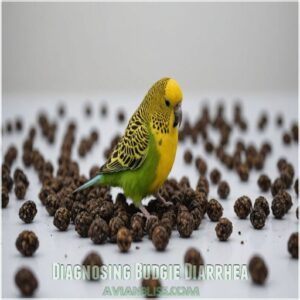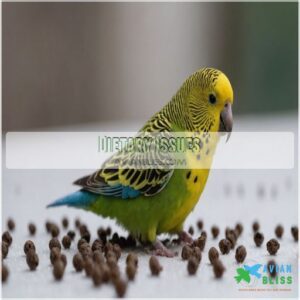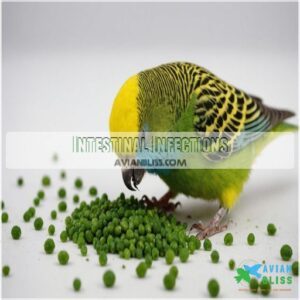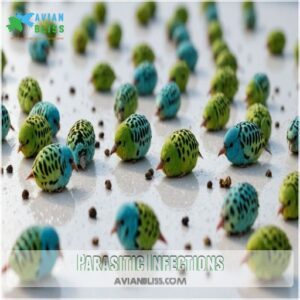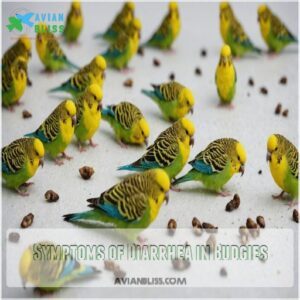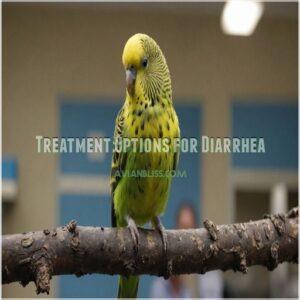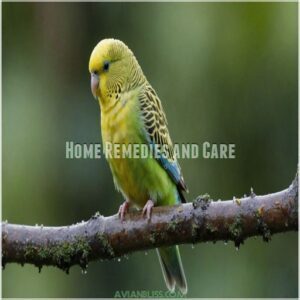This site is supported by our readers. We may earn a commission, at no cost to you, if you purchase through links.
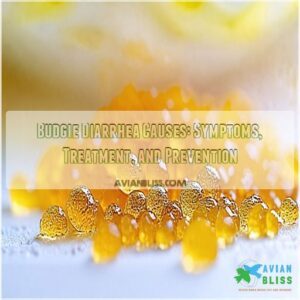
Budgie diarrhea causes can range from diet mishaps to pesky infections.
You might notice your little companion’s droppings looking more like abstract art than their usual tidy deposits.
Common culprits include poor diet choices (no more junk food parties!), bacterial or viral gate-crashers, and uninvited parasitic guests.
Even stress can send your budgie’s tummy into a tizzy.
It’s like they’ve got their own avian version of the stomach flu!
Remember, a happy gut means a happy budgie.
Keep an eye out for changes in poop consistency, color, or frequency.
There’s a whole world of budgie wellness waiting to be explored!
Table Of Contents
- Key Takeaways
- Diagnosing Budgie Diarrhea
- Causes of Diarrhea in Budgies
- Polyuria and Watery Poop
- Identifying The Root Cause
- Symptoms of Diarrhea in Budgies
- Impact of Diarrhea on Budgies
- Treatment Options for Diarrhea
- Home Remedies and Care
- Preventing Future Episodes
- Frequently Asked Questions (FAQs)
- What causes diarrhea in budgies?
- What are the causes of explosive diarrhoea?
- How to treat Budgie diarrhea?
- Are Budgie droppings a sign of diarrhea?
- What causes green diarrhea in budgies?
- What causes diarrhea in budgerigars?
- What to do when a budgie has diarrhea?
- How do you treat diarrhea in birds?
- Why is my bird having liquid poop?
- What does a sick budgie poop look like?
- Can budgie diarrhea be contagious to other pets?
- How long does it take for budgies to recover?
- Are certain budgie breeds more prone to diarrhea?
- Can changes in temperature cause budgie diarrhea?
- What role does gut bacteria play in budgie digestion?
- Conclusion
Key Takeaways
Here are 4 key takeaways about budgie diarrhea causes:
- You’ll spot budgie diarrhea by loose, watery droppings with changes in color or consistency. Watch for increased frequency and soiled feathers around the vent.
- Common causes include dietary issues, intestinal infections, parasites, and stress. Poor nutrition, sudden food changes, and environmental factors can all trigger diarrhea.
- Diarrhea can lead to dehydration, malnutrition, and behavioral changes in your budgie. Monitor their water intake, weight, and stress levels closely.
- Prevent future episodes by maintaining a clean cage, offering a balanced diet, and avoiding toxic substances. Consult a vet promptly if symptoms persist or worsen.
Diagnosing Budgie Diarrhea
To diagnose budgie diarrhea, watch for changes in your bird’s droppings, such as altered color or consistency, and check for soiled feathers around the vent.
Budgie diarrhea can be a sign of a serious health problem, so it is important to keep an eye on your bird’s behavior.
Note any lethargy or decreased activity, which could indicate more serious issues.
Changes in Droppings Color or Consistency
When monitoring your budgie’s health, keep an eye on droppings’ color and consistency.
Green droppings could signal diet issues, while black ones might mean bleeding.
White or bloody droppings, or droppings with mucus, indicate various health concerns.
Spotting these changes early helps you address budgie digestive issues and other budgie health problems, including wing-related issues such as wing lifting symptoms that can impact overall budgie behavior. Spotting these changes early helps you address budgie digestive issues and other budgie health problems before they escalate into full-blown diarrhea in budgies.
Increased Frequency of Droppings
Spotting increased frequency in your budgie’s droppings might feel like detective work, but it’s key to their health.
Frequently soiled newspapers aren’t just a call for more cage cleaning.
They might signal underlying issues like stress triggers or diet changes that can be identified with the help of budgie diarrhea products.
Keep an eye out for patterns.
Soiled Feathers Around The Vent
So, you’ve noticed your budgie’s pooping more often.
Now, look around the vent area.
Feathers sticking together or stained?
That’s a sign of a problem, and it could be a sign of watery bird poop issues.
Here’s what to watch for:
- Pasty droppings stuck to feathers.
- Discoloration of feathers near the vent.
Lethargy or Decreased Activity
A slight drop in activity could signal budgie health issues.
Notice your budgie’s behavior, especially if they’ve stopped chirping.
Lethargy might suggest stress or diarrhea.
Keep the cage environment soothing, and check their diet’s impact.
A vet check confirms budgie health and rules out diarrhea causes.
| Signs | Actions |
|---|---|
| Stress signs | Reduce stressors |
| Diet impact | Adjust diet |
| Cage environment | Improve comfort |
| Vet check | Consult vet |
Causes of Diarrhea in Budgies
When your budgie starts showing signs of diarrhea, it might be due to various causes like dietary mishaps, infections, or even stress.
Understanding these possible triggers can help you take swift action and keep your feathery friend in tip-top shape.
Dietary Issues
Is your budgie feeling off-color?
Dietary issues might be the culprit.
A low-quality seed mix can lead to nutritional deficiencies, while sudden dietary changes or food allergies might upset their delicate systems, causing diarrhea.
Offer a fresh food variety that includes nutritious options like beetroot leaves, which are packed with antioxidants and vitamins, boosting immune function. Offer a fresh food variety to boost budgie health and nutrition.
Remember, a well-balanced diet supports a happier, healthier feathered friend.
Intestinal Infections
While dietary mishaps can upset your budgie’s tummy, intestinal infections deliver another punch.
Common pathogens like Salmonella or E. coli trigger bird diarrhea, leaving your feathered friend’s droppings watery and causing distress.
Notice your budgie’s symptoms early to nip issues in the bud.
Explore treatment options, including veterinary help and probiotic use, to boost their recovery and prevention methods to avoid future flare-ups.
Parasitic Infections
Intestinal infections aren’t the only villains in budgie diarrhea tales.
Parasitic infections, often caused by common parasites like worms and protozoa, can wreak havoc on your feathered friend.
Recognizing these tiny nuisances is key to maintaining budgie health.
Employ preventive strategies and consult treatment options promptly to tackle parakeet diarrhea before it escalates into a bigger health risk for your bird.
Stress and Environmental Factors
Imagine your budgie dealing with a circus in its head due to stress-induced diarrhea.
Cage overcrowding, loud noises, or sudden temperature changes can be overwhelming, and often lead to excessive vocalization, a common signs of a lonely budgie.
Introducing new birds or travel stress throws even more fuel on the fire.
Make sure your budgie’s environment is calm and predictable to reduce stress, keeping their
Polyuria and Watery Poop
Have you noticed your budgie’s poop is unusually watery or that they’re peeing more than usual?
Let’s explore the difference between watery poop and polyuria (increased urination), common causes, and when you should seek veterinary help for your feathered friend.
Distinction Between Polyuria and Diarrhea
Let’s tackle the difference between polyuria and diarrhea in your budgie.
Polyuria means more budgie urine but normal poop consistency, usually related to increased water intake.
Changes in droppings, such as watery or discolored consistency, can also signal underlying health issues including parrot not eating and sleeping a lot.
Diarrhea, on the other hand, affects both,
Causes of Polyuria
Your budgie’s polyuria can stem from various factors affecting their delicate system.
Kidney health issues might lead to increased urine output, while dietary factors like excessive fruit consumption can upset the balance.
Liver function problems or diabetes can also trigger polyuria.
Don’t overlook stress levels; they play a significant role in your feathered friend’s overall health.
Keep an eye out for these potential culprits to maintain your budgie’s digestive health.
Causes of Watery Poop
While polyuria affects urine output, watery poop in budgies is a different ballgame.
It’s often caused by diet changes, increased fluid intake, or digestive issues.
Stress, parasites, and certain medications can also lead to this soggy situation.
Keep an eye out for sudden changes in your feathered friend’s droppings – they’re like tiny health bulletins.
If you notice persistent watery poop, it’s time to consult your avian vet for a proper diagnosis.
Identifying The Root Cause
You’ll need to play detective to find out why your budgie’s tummy is upset.
By examining your feathered friend’s diet, including potential issues with a protein-rich diet like baby birds primarily eat, environment, and overall health, you can uncover the root cause of their diarrhea and get them back to their chirpy self in no time.
Common Pathogens in Budgies
Now that we’ve covered polyuria and watery poop, let’s zero in on the troublemakers behind budgie diarrhea.
Common pathogens can wreak havoc on your feathered friend’s digestive health.
Here’s a quick rundown of the usual suspects:
- Salmonella: The sneaky bacteria that can turn your budgie’s tummy upside down
- E. coli: A gut-busting bacterial baddie
- Candida: The fungal foe that can cause yeast infections
- Parasites: Tiny troublemakers like worms and protozoa
Role of Bacteria, Viruses, and Parasites
Bacteria, viruses, and parasites can wreak havoc on your budgie’s gut health.
These tiny troublemakers are often the culprits behind diarrhea in budgies.
Bacterial contamination from Salmonella or E. coli, viral risks like polyomavirus, and pesky parasites such as coccidia can all lead to digestive distress.
It’s like having unwanted guests crash your budgie’s internal party, causing chaos in their tummy and leading to those messy droppings you’ve been noticing.
Impact of Diet and Environmental Factors
Pathogens aren’t the only culprits behind your budgie’s tummy troubles.
Your feathered friend’s diet and environment play a starring role in their digestive health.
Let’s crack the case of the runny droppings:
- Dietary detectives: Sudden food changes or poor nutrition can upset your budgie’s delicate system.
- Stress busters: Overcrowding or small cage size can ruffle more than just feathers.
- Hygiene heroes: A clean environment is your budgie’s first line of defense against diarrhea.
Symptoms of Diarrhea in Budgies
You’ll spot budgie diarrhea by their loose, watery droppings that might look different from usual.
Budgie diarrhea can be identified by changes in color or consistency.
These changes can be telltale signs your feathered friend’s tummy isn’t feeling its best.
Loose, Watery, or Excessively Runny Droppings
When your budgie’s droppings become loose, watery, or excessively runny, it’s time to pay attention.
You’ll notice a change in dropping consistency and frequency, often leaving a mess in the cage.
This change in budgie behavior can signal digestive problems.
Keep an eye on your feathered friend’s output – it’s like a health report card.
Regular cage cleaning becomes essential to prevent further issues and maintain your budgie’s well-being.
Changes in Color or Consistency
Now, let’s talk about the rainbow in your budgie’s cage – and we’re not talking feathers!
Your feathered friend’s poop palette can tell quite a story.
Green poop might mean liver trouble, white could signal kidney issues, while red or black poop is a red flag for internal bleeding.
Keep an eye out for these color changes – they’re your budgie’s way of waving a little distress flag!
Impact of Diarrhea on Budgies
Your budgie’s health can take a nosedive when diarrhea strikes, causing dehydration, weight loss, and stress.
Left unchecked, these impacts can turn your feathered friend’s world upside down, affecting both their physical wellbeing and cheerful disposition.
Dehydration and Electrolyte Imbalance
Diarrhea can quickly drain your budgie’s reserves, leaving them high and dry.
You’ll notice your feathered friend might seem off-color, with sunken eyes and dry, wrinkled skin.
They’re losing essential electrolytes faster than a leaky faucet, which is similar to how dehydration can cause constipation issues in birds, often leading to bird constipation treatment.
Keep an eye out for increased thirst,
Malnutrition and Weight Loss
As your budgie battles diarrhea, it’s not just losing water.
You’ll notice your feathered friend’s weight dropping faster than a stone, and if you’re concerned about their weight loss, you may want to check out some budgie weight loss resources.
Poor nutrient absorption becomes a real issue, leaving your budgie’s body crying out for essential vitamins and minerals.
Keep an eye on your bird’s food intake, ensuring a balanced diet that meets their nutritional needs, such as following the 40-30-20-10 rule. Keep an eye on your bird’s food intake and body condition.
A balanced diet is key to getting your little buddy back on track and feeling tip-top again.
Stress and Behavioral Changes
During episodes of diarrhea, your budgie may become a feathered stress ball.
You’ll notice behavioral changes that signal their discomfort:
- Stress-induced aggression or cage aggression
- Feather plucking or excessive preening
- Hiding behavior or reluctance to interact
- Unusual vocalizations or silence
These anxiety signals are your budgie’s way of saying, "I’m not feeling myself."
Keep an eye out for these parakeet stress indicators, as they’re often the first clues that your little friend needs some extra TLC.
Treatment Options for Diarrhea
When your budgie’s got the runs, don’t panic – there are effective treatment options available.
From vet consultations to dietary tweaks and targeted medications, you’ll find the right solution to get your feathered friend’s tummy back on track.
Veterinary Consultation
Your little feathered friend’s health is paramount.
When budgie diarrhea strikes, don’t wing it alone – a vet visit is essential.
They’ll examine your bird’s history, perform tests, and create a customized treatment plan.
To help them understand what’s going on, you can consider using a budgie diarrhea test to collect a sample for analysis.
Here’s what to expect:
| Stage | Action | Purpose |
|---|---|---|
| Initial Exam | Physical check-up | Assess overall health |
| Diagnostics | Fecal test, blood work | Identify underlying cause |
| Treatment Plan | Medication, care instructions | Address specific issue |
| Follow-up | Progress check | Make sure recovery is happening |
| Prevention | Lifestyle advice | Avoid future problems |
Remember, early intervention is key to your budgie’s swift recovery.
Dietary Adjustments
After your vet visit, it’s time to tweak your budgie’s menu.
Start by offering a high-quality seed mix or pellets to boost nutrition.
Introduce fresh veggies like carrots and leafy greens gradually.
Keep an eye out for food allergies, which can ruffle your feather friend’s digestive system.
Remember, clean water is key – change it daily to prevent tummy troubles.
A balanced diet is your budgie’s ticket to a happy, healthy gut!
Medications and Treatments
Let’s talk medicine for your feathered friend’s tummy troubles.
Antibiotics might be prescribed if bacteria are the culprits behind your budgie’s diarrhea.
Probiotics can help restore gut balance, while fluid therapy keeps dehydration at bay.
Your vet might recommend dietary tweaks and supportive care to soothe those digestive issues.
Remember, each budgie’s a unique little patient, so treatment plans are adjusted to fit their specific needs.
Home Remedies and Care
You can take steps at home to help your budgie feel better when it’s dealing with diarrhea.
From keeping your feathered friend hydrated to creating a clean, stress-free environment, these simple remedies can make a big difference in your budgie’s recovery.
Maintaining Hydration
While treating your budgie’s diarrhea, keeping them hydrated is key.
Offer fresh water frequently, and consider adding electrolyte solutions to replenish lost nutrients.
Monitor your feathered friend closely for signs of dehydration, such as sunken eyes or dry skin.
Here are some hydration tips for your budgie:
- Use a shallow dish for easy access to water
- Mist their feathers with room-temperature water
- Offer water-rich fruits like cucumber or melon
- Maintain proper humidity levels in their environment
Providing a Clean Environment
Keeping your budgie’s home spick and span is key to beating the diarrhea blues.
Clean that cage daily, swap out bedding, and disinfect toys to kick those nasty germs to the curb.
Fresh water‘s a must – change it up twice a day.
Don’t forget about air quality; good ventilation’s your buddy’s best friend.
A clean crib means a happy, healthy budgie – and fewer trips to the vet!
Offering Electrolytes
Revive your budgie’s health with electrolytes!
These important minerals combat dehydration risks during diarrhea episodes.
You can whip up a homemade solution using a pinch of salt and sugar in water, or opt for commercial options designed for birds.
Offer these alongside fresh water to replenish lost fluids.
Remember, electrolytes are just one piece of the puzzle in treating budgie digestive issues, so consult your vet for a thorough approach.
Preventing Future Episodes
You can prevent future episodes of budgie diarrhea by maintaining a clean environment, offering a balanced diet, and keeping harmful substances out of reach.
These simple steps will help keep your feathered friend’s tummy happy and reduce the chances of unexpected "presents" on your shoulder.
Clean and Hygienic Living Conditions
A spotless cage is your budgie’s fortress against diarrhea.
You’re not just cleaning; you’re building a health shield.
Regular upkeep keeps those pesky germs at bay and your feathered friend chirping happily.
- Daily: Swap out water and wipe down perches
- Weekly: Deep clean the cage, replacing bedding
- Monthly: Disinfect all accessories, including toys
Don’t forget to give your budgie a spa day with a bird bath.
It’s not just about looks; it’s a health boost!
Balanced Diet
A balanced diet is your budgie’s best defense against digestive troubles.
You’ve cleaned their home, now let’s fill their belly with goodness.
Mix up their meals with a variety of seeds, fruits, and veggies to keep their tummy happy.
Here’s a quick guide to budgie-friendly foods:
| Food Type | Examples |
|---|---|
| Seeds | Millet, canary seed |
| Fruits | Apple, banana (no seeds) |
| Veggies | Carrots, spinach |
| Protein | Cooked egg, mealworms |
| Treats | Unsalted nuts, herbs |
Remember, moderation is key.
Introduce new foods slowly to avoid upsetting their delicate digestive system.
Avoiding Toxic or Harmful Substances
You’ve got your budgie’s diet sorted, but let’s talk about keeping their environment safe.
Steer clear of household cleaners, toxic plants, and unsafe foods that could upset your feathered friend’s tummy.
Watch out for lead-containing items and questionable toys.
By creating a clean, stress-free space and maintaining good hygiene, you’ll help prevent those nasty bouts of diarrhea.
Remember, a safe budgie is a happy budgie!
Frequently Asked Questions (FAQs)
What causes diarrhea in budgies?
A bird in the hand is worth two in the bush, especially regarding budgie health.
Your feathered friend’s diarrhea can stem from dietary issues, infections, parasites, stress, or underlying health problems.
Don’t wing it; consult a vet for proper diagnosis.
What are the causes of explosive diarrhoea?
Explosive diarrhea can be caused by various factors.
You might experience it due to viral or bacterial infections, food poisoning, certain medications, or underlying health conditions.
It’s your gut’s way of rapidly expelling irritants, often with alarming force.
How to treat Budgie diarrhea?
Don’t get your feathers ruffled!
To treat budgie diarrhea, clean their cage, offer a bland diet, and make sure they’ve fresh water.
Monitor closely for 24-48 hours.
If symptoms persist or worsen, consult a vet for proper diagnosis and treatment.
Are Budgie droppings a sign of diarrhea?
Watery, loose, or abnormally colored droppings can indicate diarrhea in budgies.
However, it’s important to differentiate between diarrhea and polyuria.
By analyzing your budgie’s droppings, you can identify signs of a sick bird, such as changes in droppings color, consistency, or frequency, which can be subtle but important for a bird’s health. Monitor your bird droppings closely, looking for changes in consistency, color, and frequency.
If concerned, consult a vet promptly.
What causes green diarrhea in budgies?
Did you know that 70% of budgie diarrhea cases are diet-related?
Green diarrhea in budgies can be caused by dietary changes, infections, or liver issues.
Keep an eye on your feathered friend’s diet and consult a vet if symptoms persist.
What causes diarrhea in budgerigars?
Your budgie’s diarrhea can stem from various culprits.
Dietary issues, pesky parasites, or sneaky infections might be to blame.
Stress and underlying health problems can also wreak havoc on your feathered friend’s digestive system.
Keep an eye out for changes!
What to do when a budgie has diarrhea?
Isn’t it ironic? When your feathered friend‘s feeling under the weather, you’re the one who’s gotta clean up the mess.
Monitor their droppings, offer a bland diet, make sure they’re getting enough fluids, and keep their cage spotless.
If symptoms persist, consult a vet pronto.
How do you treat diarrhea in birds?
To treat bird diarrhea, provide clean water and a bland diet.
Monitor closely, clean the cage often, and consider probiotics.
If it persists or worsens, consult a vet immediately. They’ll diagnose the cause and prescribe appropriate treatment.
Why is my bird having liquid poop?
Liquid poop in birds can stem from various causes.
You might be dealing with dietary issues, infections, or stress.
It’s important to monitor your feathered friend closely and consult a vet if it persists beyond a day or two.
What does a sick budgie poop look like?
Don’t panic! Sick budgie poop isn’t always obvious.
Look for watery, discolored, or smelly droppings.
You might see green, yellow, or black stools, often with mucus or blood.
If you’re unsure, snap a pic for your vet.
Can budgie diarrhea be contagious to other pets?
Yes, budgie diarrhea can be contagious to other pets, especially birds.
Some causes, like bacterial infections or parasites, can spread.
Keep sick budgies isolated and maintain strict hygiene.
Consult a vet for proper diagnosis and treatment to protect your feathered friends.
How long does it take for budgies to recover?
Recovery time for budgies varies based on the cause and severity of their illness.
With proper care and treatment, mild cases may improve in a few days, while more serious conditions could take weeks.
Always consult your vet for personalized advice.
Are certain budgie breeds more prone to diarrhea?
While it’s tempting to blame genetics, no budgie breed is inherently more prone to diarrhea.
Your feathered friend’s digestive health depends on diet, environment, and care.
Keep an eye on your birdie’s droppings, regardless of its pedigree.
Can changes in temperature cause budgie diarrhea?
Temperature changes can indeed trigger diarrhea in budgies.
Sudden shifts, especially cold drafts, stress their systems.
Keep your feathered friend’s environment stable, around 70°F (21°C).
It’s like giving them a cozy, stress-free home to chirp about!
What role does gut bacteria play in budgie digestion?
Ever wondered about the tiny workers in your budgie’s belly?
Gut bacteria are essential for your feathered friend’s digestion.
They break down food, produce vitamins, and keep the digestive system in check.
It’s like a mini ecosystem in there!
Conclusion
Keeping your budgie healthy is a balancing act, but you’ve got this!
Armed with knowledge about budgie diarrhea causes, you’re ready to tackle any tummy troubles.
Remember, prevention is key: maintain a clean cage, offer a balanced diet, and keep stress at bay.
If diarrhea strikes, don’t panic. Act swiftly, consult your vet, and provide tender loving care.
Your feathered friend relies on you, so stay vigilant and proactive.
With your attention and care, your budgie will be back to its chirpy self in no time!

